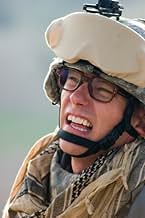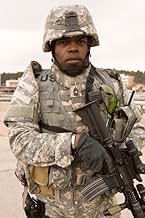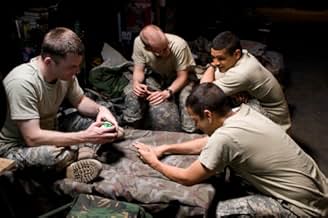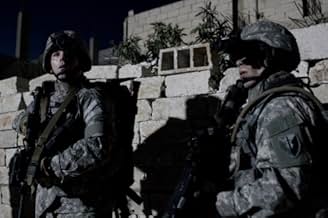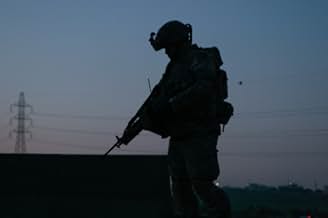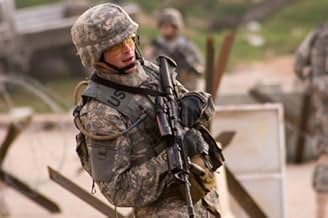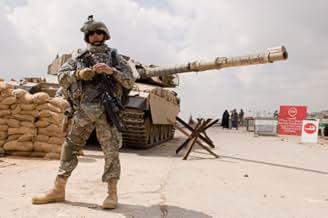IMDb-BEWERTUNG
6,1/10
11.543
IHRE BEWERTUNG
Die erschütternde Rekonstruktion der Vergewaltigung und Ermordung eines 15-jährigen irakischen Mädchens durch amerikanische Soldaten in Samarra im Jahr 2006.Die erschütternde Rekonstruktion der Vergewaltigung und Ermordung eines 15-jährigen irakischen Mädchens durch amerikanische Soldaten in Samarra im Jahr 2006.Die erschütternde Rekonstruktion der Vergewaltigung und Ermordung eines 15-jährigen irakischen Mädchens durch amerikanische Soldaten in Samarra im Jahr 2006.
- Auszeichnungen
- 6 Gewinne & 2 Nominierungen insgesamt
Anas Wellman
- Soldier
- (as Anas 'Tipsy' Wellman)
Happy Anderson
- Battalion Commander
- (as Eric 'Happy' Anderson)
- …
Empfohlene Bewertungen
"Redacted" is a shattering, powerful experience. It has been criticized by some as painful to watch...but I think that is the point entirely.
For too long, Americans have been spoon-fed a steady diet of lies about the Iraq War (not least about why we invaded that nation in the first place).
De Palma aims to shows us another side to this terrible conflict; one that we won't get on Fox News (or any of the other corporate propaganda networks). It's about time Americans got another point of view on Iraq, because we're hopelessly misinformed about what's going on there (an astonishing number of Americans including a majority of Fox News viewers STILL believe to this day that Saddam was behind 9/11). My friends in Europe don't believe me when I tell them this.
Incidentally, I don't think a film has to be pleasant to watch to be a memorable cinema experience. For example, Fassbinder never made a "entertaining" film, and yet his movies are among the most powerful in all of cinema.
The Iraq War is a horror story of untold magnitude. This film aims to capture the nightmare of the ever-shifting, chaotic Iraq battlefield. It's a film that will be hated, in knee-jerk fashion, by the Bush worshiping nut-case right-wing fringe. But for the rest of us, it's a must-see, powerful and brave film.
For too long, Americans have been spoon-fed a steady diet of lies about the Iraq War (not least about why we invaded that nation in the first place).
De Palma aims to shows us another side to this terrible conflict; one that we won't get on Fox News (or any of the other corporate propaganda networks). It's about time Americans got another point of view on Iraq, because we're hopelessly misinformed about what's going on there (an astonishing number of Americans including a majority of Fox News viewers STILL believe to this day that Saddam was behind 9/11). My friends in Europe don't believe me when I tell them this.
Incidentally, I don't think a film has to be pleasant to watch to be a memorable cinema experience. For example, Fassbinder never made a "entertaining" film, and yet his movies are among the most powerful in all of cinema.
The Iraq War is a horror story of untold magnitude. This film aims to capture the nightmare of the ever-shifting, chaotic Iraq battlefield. It's a film that will be hated, in knee-jerk fashion, by the Bush worshiping nut-case right-wing fringe. But for the rest of us, it's a must-see, powerful and brave film.
Despite the many criticisms by others on this site, Redacted is a compelling film based on an actual incident that occurred in Baghdad in 2006. Yes, the acting leaves something to be desired, the 'mixed-media' approach is distracting, and there are some manipulative moments (the beheading, the final still); But this is still an eye-opening film on the state of events in Iraq and the trials that *both* Iraqis and Americans have to deal with daily. The scenes at the checkpoint are particularly well done. Some of the dialog between the soldiers in the unit is compelling in its own way; Similarly so the scenes with the Iraqi reporters and 'embeds.'
I've seen all the recent films about Iraq ('Valley of Elah', 'Lions for Lambs', 'Rendition' ) and think that 'Redacted' provides insights none of the others do. In particular, it does an excellent job illustrating the clash between the respective cultures of Iraq and America. (50% of Iraqis can't read the signs at US checkpoints!)
Is this film a bit of an unholy mess? Yes, but see it anyway and make your own mind up. I think this one deserves at least a 6 out of 10.
I've seen all the recent films about Iraq ('Valley of Elah', 'Lions for Lambs', 'Rendition' ) and think that 'Redacted' provides insights none of the others do. In particular, it does an excellent job illustrating the clash between the respective cultures of Iraq and America. (50% of Iraqis can't read the signs at US checkpoints!)
Is this film a bit of an unholy mess? Yes, but see it anyway and make your own mind up. I think this one deserves at least a 6 out of 10.
Redacted (2007)
* 1/2 (out of 4)
U.S. soldiers working at a checkpoint in Iraq see a 15-year-old girl, which gets them hard so they eventually rape her, murder her and her family and then set them on fire. It's really hard to judge this movie because on one hand it's pretty well made but that's no excuse for the propaganda coming at you every single second of the film. There's no question this is an anti-Iraq movie made by anti-Iraq people and that's why we see the things we do. Every negative heard about American troops is on display here, which is why this film is so one sided and why I couldn't enjoy the movie. I don't give a rats butt what ones opinion on the war is but a movie needs to be open and look at all sides of an issue but this is just like a Michael Moore film as we see one side and that's the side of the director and not necessarily a side with all facts. The American soldiers are all show as crazy, raping idiots who would probably be too stupid to have a job if they weren't in the Army. Is this a good way to show troops? The Iraqi people are shown as innocent victims yet we never see the ones going around blowing innocent people up. Wait a minute, we actually do in the film when one soldier has his head cut off but the film shows this as the right thing to do to the soldier. I could go on and on about this political propaganda in this film but the actually rape case is something DePalma did before with his Vietnam film Casualties of War. The film taking one incident and trying to show it as everyday stuff is just as crazy as The Birth of a Nation. I think it would be fair to say that De Palma has lost a lot of his talent over the past few decades and it's getting harder and harder to get a good film from him. I'll end my review on this last opinion. I find it funny that celebs in Hollywood think they can bring peace to the world, end hunger, magically make dueling sides like one another and rebuild a community yet they can't even make a good movie. Perhaps it's just me but if they can't even make good films or pick a good screenplay then how in the hell are they going to have the brains to do something bigger?
* 1/2 (out of 4)
U.S. soldiers working at a checkpoint in Iraq see a 15-year-old girl, which gets them hard so they eventually rape her, murder her and her family and then set them on fire. It's really hard to judge this movie because on one hand it's pretty well made but that's no excuse for the propaganda coming at you every single second of the film. There's no question this is an anti-Iraq movie made by anti-Iraq people and that's why we see the things we do. Every negative heard about American troops is on display here, which is why this film is so one sided and why I couldn't enjoy the movie. I don't give a rats butt what ones opinion on the war is but a movie needs to be open and look at all sides of an issue but this is just like a Michael Moore film as we see one side and that's the side of the director and not necessarily a side with all facts. The American soldiers are all show as crazy, raping idiots who would probably be too stupid to have a job if they weren't in the Army. Is this a good way to show troops? The Iraqi people are shown as innocent victims yet we never see the ones going around blowing innocent people up. Wait a minute, we actually do in the film when one soldier has his head cut off but the film shows this as the right thing to do to the soldier. I could go on and on about this political propaganda in this film but the actually rape case is something DePalma did before with his Vietnam film Casualties of War. The film taking one incident and trying to show it as everyday stuff is just as crazy as The Birth of a Nation. I think it would be fair to say that De Palma has lost a lot of his talent over the past few decades and it's getting harder and harder to get a good film from him. I'll end my review on this last opinion. I find it funny that celebs in Hollywood think they can bring peace to the world, end hunger, magically make dueling sides like one another and rebuild a community yet they can't even make a good movie. Perhaps it's just me but if they can't even make good films or pick a good screenplay then how in the hell are they going to have the brains to do something bigger?
The legendary words of Marshall MacLoughan, "The media IS the message", couldn't be further seen played out as in Redacted, Brian De Palma's latest film which ventures the director back into his experimental early days as a filmmaker in New York city. In his film, the media is the message, but only in part- it's about how media is used, or how subjective perceptions are taken into account, for coverage of a conflict which ironically enough has not had the kind of coverage seen in America as in the local Iraq and European media. But what stays true to De Palma as an auteur is the idea of voyeurism, or the watchers and the audience as the ones who continue to watch, and like Godard with his video experiments, Redacted is about its subject but it's also about process.
Like Blair Witch Project, we're seeing things "as-they-happen" by the view-point of a camera that a soldier, Angel, is carrying and using as an in to get into film school someday. This might be enough for a film covering a horrible tragic turn of events like depicted in Redacted, where two soldiers rape a teenager and kill and burn her and her baby sister. But De Palma's story, based on real events which were "fictionalized" up to a point only for legal reasons, indicts the whole process of viewing things through the filter of the lens. Of course there are moments when the characters realize that they're on video, and suddenly they either get irate and continue acting as themselves, or they start to posture for the camera. Instead of the carefully plotted and directed shots of films like Dressed to Kill or Carlito's Way (or, for that matter, the similar-in-premise Casualties of War) we get the messiness of raw camera-work from the soldier, the embedded journalists, the news media covering the story, web-casts obviously out of you-tube, and as the one "official" kind of film-making a French documentary crew doing a film on the group of soldiers covering the checkpoint.
It's suffice to say that this technique is almost a comment on itself, and it's one of the curious ideas behind the experiment of Redacted that makes it interesting. We know that when a security camera or when Angel's camera put on a seat meant to be shut off captures objectively what's going on- like the "what happens in Vegas stays in Vegas" scene or the plot to go after the family. But there's an inverse to this as well since De Palma is filming this with a script and with actors (who arguably are good at being naturalistic two-dimensional soldiers), since there is a stylization, yet without calling attention to the self-consciousness the audience feels during this. And meanwhile, De Palma makes his anti-war film gripping in the unexpected places; a hard-ass sergeant who gets blown up without any warning at all; the death of one of the soldiers as revenge from a terrorist group; the scene with Flake and Rush where they take the camera themselves and (as proof beyond a doubt that war and repeated tours of duty have made them bat-s***) defend themselves while attempting to praise a fallen brother while one wears a duck hat.
One almost hopes the experiment would work even better as one of the director's best, which ultimately it isn't. Certain tactics, like making evident the pretentiousness of the French documentary by having Barry Lyndon orchestrations playing over, or the girl on the fake you-tube site blasting the soldiers, just don't work at all. And a few of the performances could use some tweaking. But Redacted, I think, has some bad rap attached to it. It's not simply about the obvious, which is that war is hell and brings out the absolute worst out of human beings who have no control over themselves once pushed beyond reason. It's also about the means of viewing something of the ultimate routine nightmare like a checkpoint, or the rape of the girl (so much that Angel can't even watch as the "fly on the wall"), or a questioning, that makes it a significant effort. De Palma distinguishes his film, for better or worse, by adding the connotation of what it means to watch, or what it means to get on record, or what it does to break the 'fourth wall' while questioning it during it. It has the same free-form ambition of De Palma's best experimental work- Hi, Mom!- if not much a great film in the end.
One thing's for sure- it's in a rightful place playing only in one theater in New York city; it's the kind of work that is hard to market beyond playing as an experimental piece. Ironically, as of late, it's been attacked by Bill O'Reilly WHILE it's being advertised during the show! Talk about counter-programming for an audience that, for the most part, until it's out on DVD, won't have a lick of what the picture really entails. Message?
Like Blair Witch Project, we're seeing things "as-they-happen" by the view-point of a camera that a soldier, Angel, is carrying and using as an in to get into film school someday. This might be enough for a film covering a horrible tragic turn of events like depicted in Redacted, where two soldiers rape a teenager and kill and burn her and her baby sister. But De Palma's story, based on real events which were "fictionalized" up to a point only for legal reasons, indicts the whole process of viewing things through the filter of the lens. Of course there are moments when the characters realize that they're on video, and suddenly they either get irate and continue acting as themselves, or they start to posture for the camera. Instead of the carefully plotted and directed shots of films like Dressed to Kill or Carlito's Way (or, for that matter, the similar-in-premise Casualties of War) we get the messiness of raw camera-work from the soldier, the embedded journalists, the news media covering the story, web-casts obviously out of you-tube, and as the one "official" kind of film-making a French documentary crew doing a film on the group of soldiers covering the checkpoint.
It's suffice to say that this technique is almost a comment on itself, and it's one of the curious ideas behind the experiment of Redacted that makes it interesting. We know that when a security camera or when Angel's camera put on a seat meant to be shut off captures objectively what's going on- like the "what happens in Vegas stays in Vegas" scene or the plot to go after the family. But there's an inverse to this as well since De Palma is filming this with a script and with actors (who arguably are good at being naturalistic two-dimensional soldiers), since there is a stylization, yet without calling attention to the self-consciousness the audience feels during this. And meanwhile, De Palma makes his anti-war film gripping in the unexpected places; a hard-ass sergeant who gets blown up without any warning at all; the death of one of the soldiers as revenge from a terrorist group; the scene with Flake and Rush where they take the camera themselves and (as proof beyond a doubt that war and repeated tours of duty have made them bat-s***) defend themselves while attempting to praise a fallen brother while one wears a duck hat.
One almost hopes the experiment would work even better as one of the director's best, which ultimately it isn't. Certain tactics, like making evident the pretentiousness of the French documentary by having Barry Lyndon orchestrations playing over, or the girl on the fake you-tube site blasting the soldiers, just don't work at all. And a few of the performances could use some tweaking. But Redacted, I think, has some bad rap attached to it. It's not simply about the obvious, which is that war is hell and brings out the absolute worst out of human beings who have no control over themselves once pushed beyond reason. It's also about the means of viewing something of the ultimate routine nightmare like a checkpoint, or the rape of the girl (so much that Angel can't even watch as the "fly on the wall"), or a questioning, that makes it a significant effort. De Palma distinguishes his film, for better or worse, by adding the connotation of what it means to watch, or what it means to get on record, or what it does to break the 'fourth wall' while questioning it during it. It has the same free-form ambition of De Palma's best experimental work- Hi, Mom!- if not much a great film in the end.
One thing's for sure- it's in a rightful place playing only in one theater in New York city; it's the kind of work that is hard to market beyond playing as an experimental piece. Ironically, as of late, it's been attacked by Bill O'Reilly WHILE it's being advertised during the show! Talk about counter-programming for an audience that, for the most part, until it's out on DVD, won't have a lick of what the picture really entails. Message?
Using video-diaries, YouTube postings, news reports and other footage, this film tells the story of one unit of US marines serving in Samarra. The heat is intense, the hours are long, the work is dull and the monotony is only broken by the occasion attack or defence of the check-points. When one of the unit is killed by an improvised explosive device, tensions are further increased and the night raids intensify to pick up suspects. However, for a couple of individuals the need for both revenge and release is almost too much to bear.
Reading the reviews on this title from IMDb users it is clear that too many people are bringing their politics to the film and some have seen the issues not the piece of work itself. So we have 10* reviews saying that "Americans don't like their own dirty laundry" and 1* reviews labelling it a "disgrace" and practically aligning De Palma with the 11th September terrorists. This does happen with such films but it is of no use to me even if my politics suggested that I should love this more than hate it. The truth is that my politics never came into it because what I was confronted with was a good idea, a topical issue, has good moments but mostly it is unconvincing and obvious in its structure and delivery.
As an idea, the brutal or callous actions of a minority of Allied forces in Iraq is an important subject and one worthy of an intelligent and impacting presentation. Likewise the use in this war of many, many different types of media that allow us to "see" the war for ourselves which is perhaps a mixed blessing is an interesting way to deliver a story. However the film doesn't manage to pull it all together in a consistent and convincing manner. It has its moments of course; the central atrocity is a shocking and difficult scene for what you don't see more than what you do but otherwise the scenes and characters don't flow together in the way that that one scene engages and convinces. I can understand why some of it felt stilted and strange because ultimately vlogs etc do feel a bit cheesy and corny at times but to me this just meant that the characters had to be extra strong so that they could stand up to the media. Sadly though they are too obvious and simple, almost to the point of cliché and they make it all feel too simplistic too easy to dismiss as biased and angry.
The dialogue doesn't help this either since it is often clumsy as it attempts to make a point or a bit too "acted" when it is supposed to be natural and jocular. De Palma's use of the various media doesn't work anywhere near as well as I thought it could; the documentary with its overuse of classical music drags on and is a poor copy of some of the music used in the film Afghansti (which is so similar that it must have been but the latter uses it sparingly and surrounds it with substance). The central vlog stumbles due to the acting and material being presented that way. It is not really the cast's fault since they are mostly unknowns and perhaps not given the best tools to show what they can do but it does mean the film is mostly reasonably poor. De Palma does deserve credit for taking on a challenging and topical project where he could just continue to rest of his laurels and take easy projects for money, but this does not buy him a free pass because good intentions are not anything unless they are followed through on the ground.
Redacted is just that a good plan on paper but the execution is lacking across the board, taking away from even the plan itself. Those looking to feel the film's anger and outrage will probably get more from it than the casual viewer but just because a film works when playing to the choir doesn't mean it is good. Sadly for the casual viewer I suspect it will come over as too obvious, preachy and half-done to really impress.
Reading the reviews on this title from IMDb users it is clear that too many people are bringing their politics to the film and some have seen the issues not the piece of work itself. So we have 10* reviews saying that "Americans don't like their own dirty laundry" and 1* reviews labelling it a "disgrace" and practically aligning De Palma with the 11th September terrorists. This does happen with such films but it is of no use to me even if my politics suggested that I should love this more than hate it. The truth is that my politics never came into it because what I was confronted with was a good idea, a topical issue, has good moments but mostly it is unconvincing and obvious in its structure and delivery.
As an idea, the brutal or callous actions of a minority of Allied forces in Iraq is an important subject and one worthy of an intelligent and impacting presentation. Likewise the use in this war of many, many different types of media that allow us to "see" the war for ourselves which is perhaps a mixed blessing is an interesting way to deliver a story. However the film doesn't manage to pull it all together in a consistent and convincing manner. It has its moments of course; the central atrocity is a shocking and difficult scene for what you don't see more than what you do but otherwise the scenes and characters don't flow together in the way that that one scene engages and convinces. I can understand why some of it felt stilted and strange because ultimately vlogs etc do feel a bit cheesy and corny at times but to me this just meant that the characters had to be extra strong so that they could stand up to the media. Sadly though they are too obvious and simple, almost to the point of cliché and they make it all feel too simplistic too easy to dismiss as biased and angry.
The dialogue doesn't help this either since it is often clumsy as it attempts to make a point or a bit too "acted" when it is supposed to be natural and jocular. De Palma's use of the various media doesn't work anywhere near as well as I thought it could; the documentary with its overuse of classical music drags on and is a poor copy of some of the music used in the film Afghansti (which is so similar that it must have been but the latter uses it sparingly and surrounds it with substance). The central vlog stumbles due to the acting and material being presented that way. It is not really the cast's fault since they are mostly unknowns and perhaps not given the best tools to show what they can do but it does mean the film is mostly reasonably poor. De Palma does deserve credit for taking on a challenging and topical project where he could just continue to rest of his laurels and take easy projects for money, but this does not buy him a free pass because good intentions are not anything unless they are followed through on the ground.
Redacted is just that a good plan on paper but the execution is lacking across the board, taking away from even the plan itself. Those looking to feel the film's anger and outrage will probably get more from it than the casual viewer but just because a film works when playing to the choir doesn't mean it is good. Sadly for the casual viewer I suspect it will come over as too obvious, preachy and half-done to really impress.
Wusstest du schon
- WissenswertesThe scene where Salazar is smiling as he films a scorpion being devoured by ants is an homage to the beginning of Sam Peckinpah's The Wild Bunch (1969) where a group of children gleefully watch scorpions being eaten by ants .
- PatzerIn one scene, PFC Reno Flake refers to SPC Lawyer McCoy as a "Corporal" when in fact his rank is that of Specialist.
Top-Auswahl
Melde dich zum Bewerten an und greife auf die Watchlist für personalisierte Empfehlungen zu.
- How long is Redacted?Powered by Alexa
Details
- Erscheinungsdatum
- Herkunftsländer
- Offizielle Standorte
- Sprachen
- Auch bekannt als
- Redacted
- Drehorte
- Produktionsfirmen
- Weitere beteiligte Unternehmen bei IMDbPro anzeigen
Box Office
- Budget
- 5.000.000 $ (geschätzt)
- Bruttoertrag in den USA und Kanada
- 65.388 $
- Eröffnungswochenende in den USA und in Kanada
- 25.628 $
- 18. Nov. 2007
- Weltweiter Bruttoertrag
- 784.604 $
- Laufzeit
- 1 Std. 30 Min.(90 min)
- Farbe
- Sound-Mix
- Seitenverhältnis
- 1.85 : 1
Zu dieser Seite beitragen
Bearbeitung vorschlagen oder fehlenden Inhalt hinzufügen


